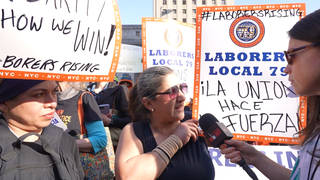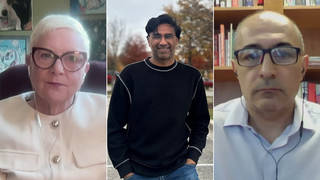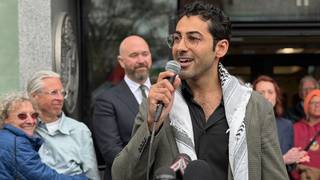
Topics
Guests
- Jeffrey Sachsdirector of The Earth Institute at Columbia. He is also president and co-founder of Millennium Promise Alliance, a nonprofit organization aimed at ending extreme global poverty. He is the author of numerous books and articles on development and economic policy.
President Barack Obama and congressional leaders reached a last-minute budget deal on Friday, narrowly averting a government shutdown. The deal would cut roughly $38 billion from a federal budget expected to exceed $3.7 trillion this year. We speak to Jeffrey Sachs, director of the Earth Institute at Columbia University. “Many of us who supported President Obama just feel that he’s abandoned the field,” Sachs says. “He’s left it to the right wing, which wants nothing more than taxes cut for the rich, whereas the American public is saying very clearly, in every opinion survey, one after another, if you want to close the deficit, go after taxes for the rich, raise them, cut military spending, cut the excess profits in the insurance industry and healthcare, do things that would really make a difference—don’t punish the poor.” [includes rush transcript]
Transcript
AMY GOODMAN: President Barack Obama and congressional leaders reached a last-minute budget deal Friday, narrowly averting a government shutdown. The deal would cut roughly $38 billion from a federal budget expected to exceed $3.7 trillion this year. Many details have yet to be worked out.
Much of the deal has not yet been made public. Known cuts include $13 billion from the Departments of Labor, Education and Health and Human Services. The GOP won a stand-alone vote over barring Planned Parenthood from accessing federal funds. A vote on defunding public broadcasting was dropped, as was a ban on using Environmental Protection Agency funds to regulate greenhouse gas emissions. President Obama characterized some of the cuts as, quote, “painful.”
PRESIDENT BARACK OBAMA: This agreement between Democrats and Republicans, on behalf of all Americans, is on a budget that invests in our future while making the largest annual spending cut in our history. Like any worthwhile compromise, both sides had to make tough decisions and give ground on issues that were important to them. And I certainly did that. Some of the cuts we agreed to will be painful.
AMY GOODMAN: White House Senior Adviser David Plouffe announced yesterday President Obama plans to release a long-term plan on reducing the nation’s deficit Wednesday. Speaking on Meet the Press, he said President Obama will insist the nation cannot afford to continue tax breaks for the wealthiest Americans.
SENIOR ADVISER DAVID PLOUFFE: Now, under the Republican congressional plan, people over $250,000 get over a trillion dollars in tax relief. So this is the important thing: you’re making a choice. You’re asking seniors, the middle class to pay more. You wouldn’t be having to do that if you weren’t giving the very, very wealthiest in this country just enormous tax relief.
AMY GOODMAN: Plouffe made it clear that the House Republicans’ alternative, crafted by House Budget Committee Chair Paul Ryan, Republican of Wisconsin, was unacceptable. He said, “[Ryan’s plan] might pass the House, but it’s not going to become law.”
Obama is also expected to propose cuts to entitlement programs, including Medicare and Medicaid, and changes to Social Security, a discussion he has largely left to Democrats and Republicans in Congress.
Well, to discuss the budget deal, we’re joined right now by leading economist Jeffrey Sachs of Columbia University. He is director of the Earth Institute at Columbia and also president and co-founder of Millennium Promise Alliance, a nonprofit group aimed at ending extreme global poverty. He’s the author of numerous books and articles on development and economic policy.
Welcome to Democracy Now! Your understanding of what this agreement is?
JEFFREY SACHS: Well, this is a miserable step in the wrong direction. It started last December, when Obama and the Republicans agreed to cut a trillion dollars of taxes by extending the Bush tax cuts. And now, even though the details aren’t even worked out, apparently, they’re slashing into programs for the poor. So this is all going in the wrong direction, and many of us who supported President Obama just feel that he’s abandoned the field. He’s left it to the right wing, which wants nothing more than taxes cut for the rich, whereas the American public is saying very clearly, in every opinion survey, one after another, if you want to close the deficit, go after taxes for the rich, raise them, cut military spending, cut the excess profits in the insurance industry and healthcare, do things that would really make a difference — don’t punish the poor. And yet, that’s what Obama is giving up right now. It’s absurd. And when Plouffe says, “Well, it’s unacceptable that the taxes on the rich have come down,” the President not only agreed to that last December, but when they announced the compromise this weekend, he referred to that historic agreement last December. So the whole thing is a bit of a mass confusion, and I find it absurd.
AMY GOODMAN: Talk about the four proposals.
JEFFREY SACHS: I say that there really are four proposals on the table right now. One is the Ryan plan; that is the extreme right: just do anything, slash anything, hit the poor, in order to get the tax rates down on the rich. It’s a fraud. But they have momentum because Obama is not resisting.
Then there was Obama’s muddle, because he put forward a budget plan last month, after all, not only for fiscal year 2012, but a decade-long framework. He agreed to keep taxes so low on the rich that, in effect, his proposals, if you look at the fine print, would squeeze the so-called civilian discretionary budget, where education, where infrastructure, energy, climate would all be squeezed to an unmanageable small level.
Then there’s a new proposal that the Congressional Progressive Caucus put forward last week. Terrific. It’s called the People’s Budget. It actually responds to what the people want, and that is, raise taxes on the rich, raise taxes on the corporations that are getting away with absolute unbelievable — unbelievably abusive loopholes, cut military spending, preserve spending for the poor, for education, for investment and so forth.
Then there’s a fourth position. That’s the American public. You notice the American public isn’t asked by Congress or the President these days, but the American public speaks clearly in opinion survey after opinion survey. It says the rich have had a free ride, the corporations have been running our country, the spending on the military is completely unjustified, and we want a public option on healthcare. All large majorities, not one of them happening. Why? Because the lobbyists are in control, both of the White House and Congress.
AMY GOODMAN: Now, you’re not just talking about in control of the White House and Congress, but what about the press? When you talk about these opinion polls that show a very progressive America, this is not reflected across the networks when you watch TV.
JEFFREY SACHS: Well, first of all, Fox News is pure propaganda. We know that. But it’s just relentless propaganda, and people respond to it. To my mind, the Tea Party is nothing but a Fox News Channel propagandistic creation. This is Roger Ailes at work. So that’s one part of it. But it gets a lot of — lot of press.
Same thing with the Wall Street Journal editorial page. That’s our leading business press, but it’s so relentlessly phony and right wing on the editorial page that you never hear anything about the middle. It’s only about tax cuts. It’s all this drum beat to cut taxes, cut taxes, cut taxes.
Then the mainstream, you know, basically, the New York Times, as far as I’m concerned, it just tries to protect its inside line to the White House. So, whatever the White House says, that’s what it reports. But it doesn’t report the fact that there’s a whole public opinion out there that needs to be covered. And I find that very, very sad.
AMY GOODMAN: But even outside of Fox, these discussions, for example, raising the issue of the military, that people recognize this as a huge drain on the budget, this is not raised, rarely in discussion.
JEFFREY SACHS: It’s true. When I am on talk shows and people talk about what to do, it’s all wringing your hands: “We have to cut entitlements, we have to cut entitlements.” But the public is saying, “Can we get out of Afghanistan?” What an incredibly wrongheaded policy, wasting more than $100 billion a year, achieving nothing. But you’re right, this doesn’t get discussed.
AMY GOODMAN: And then, what about healthcare? What about these costs, and what can be done about it?
JEFFREY SACHS: Basically in healthcare, the U.S. has the most expensive system for what’s delivered of all the high-income countries. Why? Because we have this huge private sector health insurance industry. It’s hugely overmanned. Salaries are enormous. They spend a tremendous amount advertising, which doesn’t happen in other healthcare systems. Our specialists are paid way out of line with what happens in other countries. And that’s because we have a system that allows these huge costs, and then the government just pays a kind of cost-plus pricing, whereas a public option would get that under control and a system, called capitation, where basically insurance — or, health providers and public sector providers are responsible for the person and the family as a whole, not operation or procedure, one after another, that they get reimbursed for, is the much more efficient, low-cost way to do things.
All of it is to say, when the public option was taken off the table last year, despite a strong support of the public — and why did Obama take it off the table? Because the lobbyists told him to take it off the table. When that was taken off the table, we lost the chance to get healthcare costs under control. This is the problem. It’s lobbyists, morning 'til night. Whether it's lobbyists for healthcare, lobbyists for the financial sector, lobbyists for the war industry, and lobbyists for the tax cuts, they’re running Washington, both the White House and the Congress. And what the public wants — actually, the broad majority of the public — doesn’t get heard.
AMY GOODMAN: Talk more about the People’s Budget.
JEFFREY SACHS: The People’s Budget is a proposal of the leadership of 80 members of Congress, which is called the Progressive Caucus. I was so happy —
AMY GOODMAN: The largest caucus in Congress.
JEFFREY SACHS: I was so happy to see it when I saw it for the first time last week as it was being unveiled. I said, “Thank God. Something coming from Washington that makes sense,” because they, too, have been crowded out. The White House has played a game, basically. If the far right is holding the agenda, the White House says, “We’ll be one step towards the center of the far right.” But that means giving concession after concession after concession. What Obama is trying to do is to look reasonable, to look a little bit more reasonable than the extreme right. But to do so, he’s just compromising, compromising on core principles.
Then, finally comes the Congressional Progressive Caucus and says, “Stop it. Let’s do what the people really want.” This is the wonderful thing about America. Sometimes you feel so frustrated: “What’s going on in this country?” as if everybody’s a Tea Partier. It’s not true. The broad majority of the public has very reasonable, very mainstream and compassionate views. They say, “Don’t slash for the poor. No, let’s start making the rich pay their due.” That’s what the public says, the large majority. Who’s listening? Or who’s hearing them? The media keeps them out, by and large. And the White House and the Congress are dominated by the lobbies and by the concern about raising campaign funds. After all, President Obama is trying to raise a billion dollars for his 2012 election. Where is he going to get that? On Wall Street. Are they telling him, “Raise the taxes”? Unfortunately not.
AMY GOODMAN: What about House Speaker Boehner. What role is he playing in this?
JEFFREY SACHS: Well, the Republican Party is dominated by a absolutely obsessive single idea: slash anything, cut anything, as long as the taxes for our rich patrons come down. That’s the role he’s playing.
AMY GOODMAN: You talk about the different proposals as a — the taxes as a percentage of the GDP.
JEFFREY SACHS: Yes.
AMY GOODMAN: Explain.
JEFFREY SACHS: Basically, right now, we’re collecting this year only 15 or 16 percent of our gross national income, or gross domestic product, as taxes. That’s not enough to pay for even the most basics of government, for Social Security, for Medicare or Medicaid, military, interest on the debt. And then you have all the rest government is needed for to help educate our children, to help keep our children safe, to have the infrastructure for productive economy, to address climate change and so forth. There’s no money for that right now.
The only way seriously to have government do what government needs to do for the American people is to raise revenues right now. Now, in a normal economic recovery, maybe our current tax system would go back up to 17 or 18 percent. Ryan’s proposal and Obama’s proposal is to stop somewhere 19 to 20 percent. But if you look at what we really need to have a normal country, we would have to be 23, 24 percent of GNP — that’s just basic arithmetic — to cover our core costs and to be able to face the needs of the American people for education, for roads that don’t collapse, for a climate that doesn’t get wrecked, for a modern energy system, for science and technology, for our competitiveness. So, this means tax — taxes on the rich and on the companies have to go up, if we’re going to have a normal country. But the Republicans are dead set against it. And until now, Obama has just compromised, compromised, compromised.
AMY GOODMAN: I know you have to go teach a class. How do you think President Obama has most failed the American people?
JEFFREY SACHS: He hasn’t led. His job in our constitutional system is to help show a way forward and help to explain, help to say why we need to go this way, not to stand in the back and then announce how historic an agreement is to slash taxes on the rich or how historic an agreement is to cut $38.5 billion that’s going to slash programs for the poor. That’s not his job. His job is to lead. That’s why we who supported him — I was one of them — expected something very, very different. Now, Wednesday, maybe he’s going to try again. We hear from Plouffe, OK, this time it’s for real. But if he comes out and does again what he’s been doing, I just think he’s lost the core, the heart, of the political movement that basically supported him to bring him to office.
AMY GOODMAN: Jeffrey Sachs, I want to thank you very much for being with us, leading economist, director of the Earth Institute at Columbia University, also president and co-founder of Millennium Promise Alliance.













Media Options